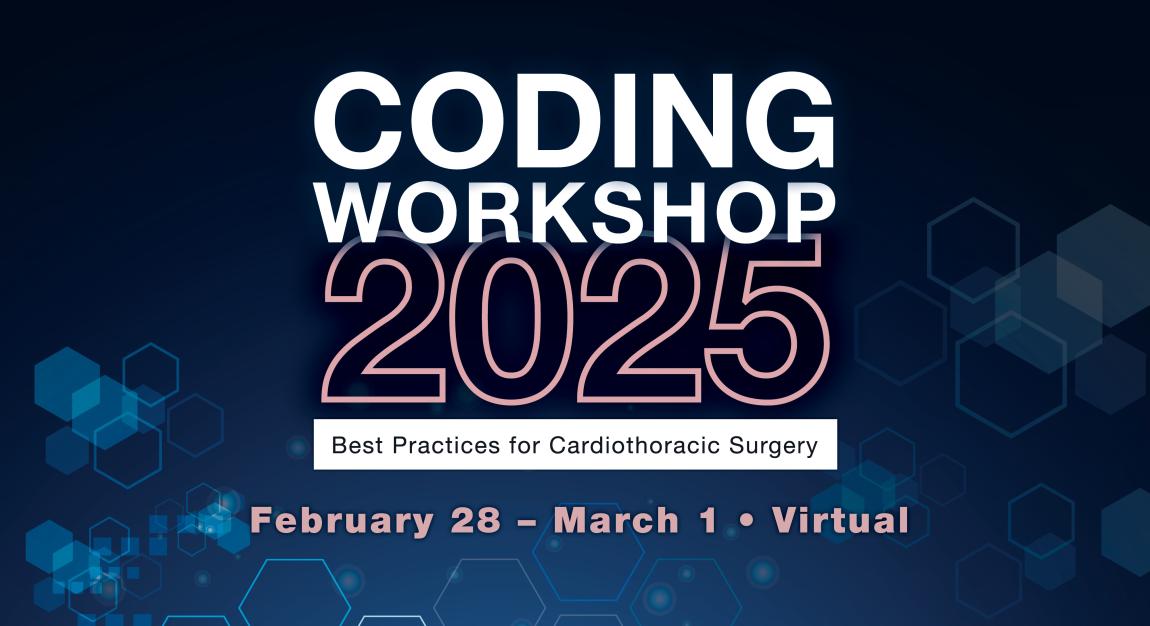Description
The 2025 STS Coding Workshop: Best Practices for Cardiothoracic Surgery is a 2-day virtual event that provides coders, surgeons, and billing professionals with the latest updates to CPT and physician coding and reimbursement. Sessions include live panel discussions, Q&A responding to scenario-based questions submitted by attendees before and during the meeting, and challenging coding examples.
Additionally, participants will have access to supplemental online content to enhance their coding knowledge. This educational event covers coding specific to cardiothoracic surgery, with concentrations in Evaluation and Management (E/M) visits, Adult Cardiac Surgery, Congenital Heart Surgery, General Thoracic Surgery (Esophagus, Mediastinum, Pulmonary), and Vascular Surgery. The program also focuses on physician reimbursement issues affecting the entire specialty.
Target Audience
Cardiothoracic surgeons, cardiothoracic surgery coders, office managers, medical billing specialists, physician assistants, nurses, and anyone else involved in the coding, reimbursement, and compliance efforts for the CT surgery office.
Learning Objectives
Upon completion of this activity, participants should be able to:
- Identify new CPT codes, updates and payment policies affecting cardiothoracic surgery coding for 2025.
- Relate the importance of specificity and identification of services provided in a patient encounter.
- Recognize coding and reimbursement criteria in order to identify and capture relevant documentation elements efficiently.
- Explain common coding issues for each subspecialty and how they should be reported and resolved.
- Discuss the 2025 changes to the E/M modifiers and guidelines.
- Summarize the necessary documentation and regulations relevant to critical care and cardiothoracic surgery E/M services for 2025.
Live Q&A Discussion
Agenda subject to change
Friday, February 28
4 - 4:15 p.m. EST - Welcome/Introductions
4:15 - 5:30 p.m. EST - Adult Cardiac Q&A
5:30 - 6:15 p.m. EST - Vascular Surgery Q&A
6:15 - 7 p.m. EST - Congenital Cardiac Q&A
Saturday, March 1
10 - 11 a.m. EST - General Thoracic Q&A
11 a.m. - 12 p.m. EST - Esophageal Q&A
12 - 12:30 p.m EST - Break
12:30 - 1:30 p.m. EST - E/M, Critical Care, Telehealth Q&A
1:30 - 2 p.m. EST - Physician Documentation Q&A
Submit your questions in advance to be considered for the live Q&A portion of the STS Coding Workshop.
On-Demand Content
Each session contains video lectures from our faculty covering each bulleted topic. Participants are strongly encouraged to view these lectures before the live Zoom sessions.
Session 1: Adult Cardiac Surgery
- VADS
- TAVR
- ECMO
- MAZE
- CABG
- Aortic Valve Procedures
- Mitral Valve Procedures
- Pulmonary and Tricuspid Valve Procedures
- Thoracic Aortic Procedures
- Other Adult Cardiac Procedures
- Adult Cardiac FAQ
- Adult Cardiac Coding Case Scenarios
Session 2: Congenital Cardiac Surgery
- Valves
- Artery and Vessel Procedures
- Complex Cardiac Anomalies
- Coding for Septal Defects: ASD, VSD, AVSD
- Coding for ECMO and VADs
- Other Congenital Cardiac Procedures
- Endovascular Repair of Congenital Heart and Vascular Defects
- Congenital FAQ
- New Congenital Codes
- Congenital Coding Case Scenarios
Session 3: Vascular Surgery
- TEVAR: Thoracic Endovascular Aneurysm Repair
- EVAR: Endovascular Aortic Therapies
- FEVAR: Fenestrated/Branched Enograph
- Embolectomy and Thrombectomy
- Vascular Catheterizations
- Endovascular Venous Insufficiency
- Percutaneous AV Access
- Vascular Coding Case Scenarios
Session 4: General Surgery
- Open Lung Resections
- Thoracoscopic Lung Resections
- Other Thoracic Procedures
- Pleural Procedures
- Bronchoscopy Procedures
- Mediastinal, Pericardial, Thymectomy, and Diaphragmatic Procedures
- Musculoskeletal Procedures
- General Thoracic FAQ
- General Thoracic Coding Case Scenarios
Session 5: Esophageal Surgery
- Endoscopic Esophageal Procedures
- Esophageal Resection Procedures
- Hiatal Hernia Procedures
- Other Esophageal Procedures
- Esophageal FAQ
- Esophageal Coding Case Scenarios
Session 6: E/M, Critical Care, & Telehealth
- Evaluation & Management Services
- Critical Care Services
- Shared or Split Visits, New Guidelines
- Telehealth Services
Session 7: Physician Documentation
- Overview of Hospital and Physician Reimbursement
- Coding & Documentation Tips to Achieve Maxmium Reimbursement
Pricing
| Early Bird (through Jan. 17, 2025) | Standard (Jan. 18 - March 1) | |
|---|---|---|
| STS Members and Their Employees* | $250 | $300 |
| Non-members and Staff Unaffiliated with an STS Member | $300 | $350 |
*An STS Member ID (6 digits) is required to receive the discounted member rate. For help with an STS Member ID, contact Member Services.
Coders will need to register in their own name; in order to qualify for the STS Member discount, they must supply the name of their surgeon.
PDF Registration Form
Accreditation
Accreditation Statement
The Society of Thoracic Surgeons is accredited by the Accreditation Council for Continuing Medical Education (ACCME) to provide continuing medical education for physicians.
The Society of Thoracic Surgeons designates this live activity for a maximum of 28 AMA PRA Category 1 Credits™. Physicians should claim only the credit commensurate with the extent of their participation in the activity. Physician Assistants (PAs) may claim AMA PRA Category 1 Credits™ for completing this activity.
Continuing Education Credits
This program has prior approval of AAPC for 28 continuing education hours. Granting of prior approval in no way constitutes endorsement by AAPC of the program content or the program sponsor.
